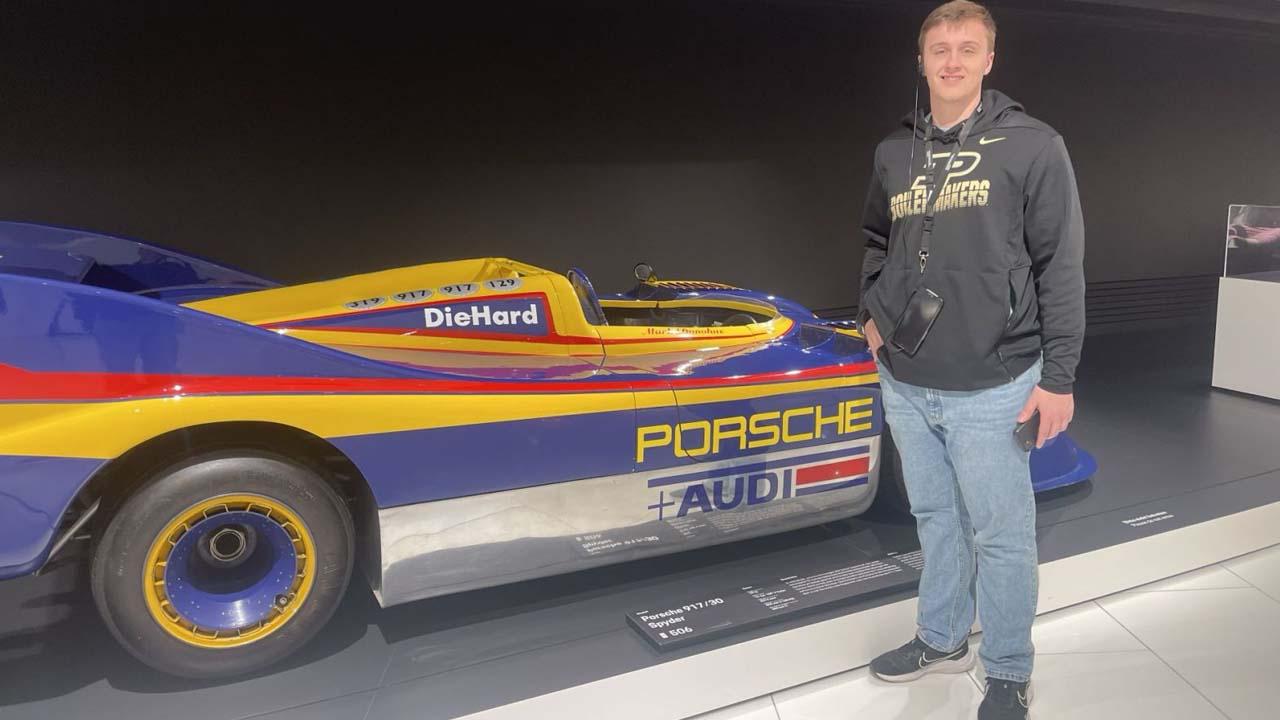Jake Lautenschlager arrived at Purdue University from Terre Haute, Indiana, with plans to be a stellar pitcher on the baseball team and earn his degree in unmanned aerial systems. Plans changed, as they often do for first-year students, sending him in a new direction that he neither researched nor encountered prior to college.
He changed his major to Supply Chain and Sales Engineering Technology after class scheduling conflicts, but his route there was hardly straightforward. Baseball did not pan out as expected. One torn rotator cuff and a long recovery later, he had to pivot from his pitching goals, but Lautenschlager refused to let his momentum and energy fizzle out.
“I was talking to a friend on the baseball team who ran into the same scheduling situation and made the switch into the supply chain program. His uncle was the director of a distribution center and had a good job with decent pay. So I kind of blindly followed him into it,” he said, laughing.
The COVID-19 pandemic had made the international supply chain top-of-mind for many, as it proceeded to disrupt supply chains and force companies to rethink their strategies. Even though the new major was a sudden shift, Lautenschlager says it was good timing to begin studying the supply chain and sales engineering fields.
Beyond textbook learning
James Tanoos, a clinical associate professor in the School of Engineering Technology, has worked in higher education for more than 20 years and is known for creating hands-on, cross-cultural learning experiences for supply chain students. He took a team supply chain students to the National Team Selling Competition (NTSC) last fall, which was hosted by Indiana University’s Kelley School of Business. Lautenschlager was one of four students representing Purdue in competition against several university teams from across the nation.
NTSC gives students a chance to experience a realistic sales scenario over the course of three days. The team had to present their product in a mock selling scenario and respond to buyer feedback in round two.
While Purdue’s team did not make it to the third and final round of NTSC, Lautenschlager says the experience has given him confidence for the kinds of career opportunities he hopes to have in the future.
“It was a significant experience,” he said about NTSC. “Being in the interviewing process, asking questions, getting feedback—it definitely felt like a real-world experience. I learned that everything people say has value.”
 Experiential learning is a highlight of the program, he says. Like the NTSC experience, supply chain students also travel abroad to visit top German automotive manufacturers and a partner university. Tanoos leads the annual trip to Germany, and Lautenschlager attended in 2024 during spring break.
Experiential learning is a highlight of the program, he says. Like the NTSC experience, supply chain students also travel abroad to visit top German automotive manufacturers and a partner university. Tanoos leads the annual trip to Germany, and Lautenschlager attended in 2024 during spring break.
Over six days, they toured factories for Mercedes-Benz and Porsche in Stuttgart, had cultural and historical experiences in Munich and Dachau, and spent time at Reutlingen University, which offers a dual degree master’s program in engineering in collaboration with Purdue.
The following summer, Lautenschlager completed an internship with Belden. Belden is an expansive company with more than a dozen brands involved in manufacturing products for end-to-end networking, security and connectivity.
Lautenschlager gained hands-on experience at the headquarters of Belden's Broadband Solutions in Syracuse, New York. He learned about their inventory system, helped the team roll out a new product line and streamlined shared documents for production planning. Tanoos says his Belden internship led to the company visiting campus to do more recruiting at the 2024 Industrial Roundtable career fair.
Rounded-out and ready for work
As they move into their final year, students are leaning into networking opportunities and job hunting. Lautenschlager is already interviewing and pursuing a career in sales with the long-term goal of becoming a sales engineer in the tech industry. He says new students should arrive ready for a challenge and remember to lean on their peers.
“There are a lot of manufacturing classes that go into the program, so it really rounds you out so you’re not a subject matter expert in just one thing. I now have experiences in CAD, coding, sales, operations management, statistics. You learn things you didn’t expect.”
Lautenschlager also met his fiancée at Purdue. She graduated with a degree in actuarial science and is now a cheerleader with the Chicago Bulls. Watching her cheer over the years has helped him make surprising connections with some Purdue alumni in his dream industry. He hopes his broad networking efforts in Chicago, Germany, New York, and West Lafayette will pay off in the workforce.
The Supply Chain and Sales Engineering Technology program is part of the School of Engineering Technology. Students in the program learn to manage the global business processes that control the flow of goods, information, and services from companies that produce them to the customers who use them.
Alongside study abroad trips and internships, several courses in the program offer opportunities to practice sales, consultation, and other skills. The Lean Six Sigma course prepares students for the Green Belt Certification exam, which results in a certification relevant for the automotive, electronics, healthcare, manufacturing, and transportation industries.
Tanoos says the Purdue name benefits supply chain students, and he’s seen them find placements at Boeing, Microsoft, and Allison Transmission over the past year. He believes Lautenschlager will “hit the ground running” after graduation.
“Jake is an outstanding ambassador for Purdue. He has taken advantage of the numerous opportunities that Purdue University has to offer, and he's parlayed them into career pursuits, new adventures, and resume-builders,” said Tanoos. “I'm proud to have played a small part in providing Jake various opportunities that he's successfully endeavored.”

